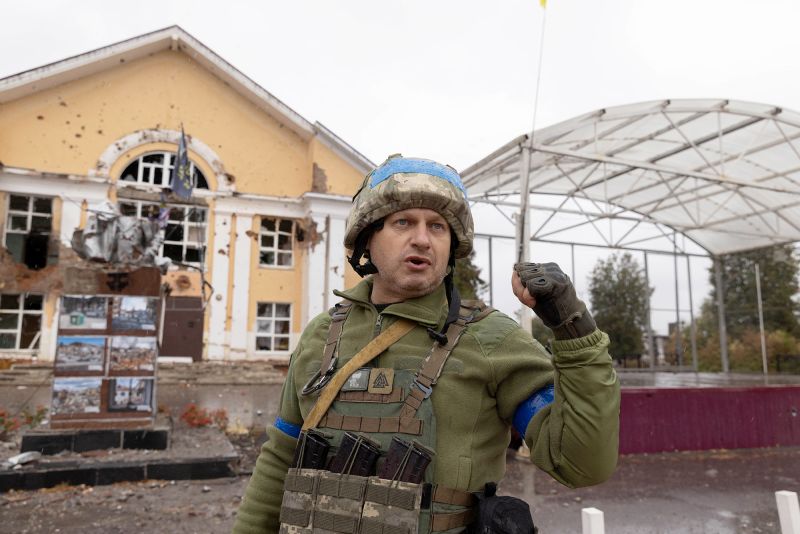Ukraine’s incursion into Russia’s Kursk region is now entering its third month, with scores of settlements still firmly under its control.
The operation marked the first time foreign troops entered Russian territory since World War II – embarrassing the Kremlin and proving to Kyiv’s backers and the rest of the world that Ukraine’s military was not perpetually on the back foot.
Some nine weeks later, Ukraine’s advance has stalled, and neither side has made major gains or counterattacks in recent days.
The endgame is unclear. Analysts believe Kyiv is trying to use its initial momentum for a morale boost and a potential bargaining chip, while Russian President Vladimir Putin is trying to downplay the entire incursion and limit the resources Russia’s war machine devotes to countering it.
What’s the latest on the ground?
Ukraine has maintained a foothold in Kursk of about 786 square kilometers (300 square miles), according to the latest assessment by the Institute for the Study of War (ISW), a think tank in Washington, DC.
Ukraine’s main foothold is around the Russian town of Sudzha and its military is trying to establish a second foothold around Veseloe village. Ukraine has not disclosed how many troops it has sent to the region.
Russia has deployed a reasonably large number of troops – estimated at 40,000 – to defend and counterattack in Kursk, but analyst Mark Galeotti described the initial force as “built from wherever they can find,” with Russia using conscripts and reservists at the outset of the incursion.
Moscow has since deployed more experienced forces, but not as many resources as Russian civilians in Kursk would perhaps want.
As fighting in the area continues, Russian authorities say more than 100,000 civilians have been displaced, while many others find themselves living behind Ukrainian lines.
“Over time, there is a degree to which the Kursk operation has become normalized,” Galeotti said. “We shouldn’t assume that Russians have just come to accept it… I think Putin has managed to postpone judgment, but I don’t think it’s been completely waived.”
Why hasn’t Russia’s response been stronger?
Russia is trying to avoid diverting any resources from the frontlines of its full-scale invasion of Ukraine to fight in Kursk.
Although the incursion was initially a shock to both the government and ordinary Russians, “the Kremlin has played this down,” according to John Lough, an associate fellow at Chatham House’s Russia and Eurasia Program. “The strategy is to distract the population from what’s happened, which is undoubtedly a major embarrassment, and to create the impression that this is not serious.”
Putin’s government has characterized it as a “raid” and even downplayed their counterattack as a “counterterrorism mission.”
One Russian military blogger put the normalization into stark words, saying: “Most of Russia has already got used to the fighting near Kursk… Those who have nothing to do with the Kursk region are rather sluggishly interested in what is happening.”
Frontlines are moving only slightly, but the fighting is reportedly fierce, with Russian forces deploying numerous drones, barrel artillery and aerial bombers, according to the Ukrainian commander.
“They don’t hesitate to drop a bomb on a tree line if they assume we have troops there,” Ukrainian battalion commander “Kholod” said. He claims Russia has now sent a powerful group of troops and combat brigades to where his unit is fighting in Kursk, and argued the Russian counterattack was staved off by Ukraine’s drone and mine attacks.
What has Ukraine achieved?
The incursion into Kursk likely had multiple goals, analysts say, including giving Ukraine a narrative win.
“Their goal was to demonstrate to Ukraine’s Western allies that the Russians are vulnerable and that there are limits to their ability to deploy combat power,” said Lough, adding that the incursion also highlighted how “Russia’s red lines are rhetorical.”
Yet Ukraine’s goal of diverting troops from the eastern frontline to Kursk has so far failed.
Kursk could still be a bargaining chip for negotiations in the future, though, experts said.
“By taking this territory, they immediately ruled out the possibility of both the Russians and the Western allies saying, ‘Now it’s time to stop. Let’s have a ceasefire,’” Lough said.
Focus still on eastern Ukraine
Meanwhile, the primary focus of the war remains on the frontlines in Ukraine’s eastern Donbas region, where its troops are fighting to retain control of the strategic city of Pokrovsk.
Rather than focus resources on liberating their own territory, the Russian military has expanded its assaults on multiple fronts in Ukraine, including in key areas of Kharkiv, Donetsk and Zaporizhzhia.
“It seems to be a very high priority for the Kremlin to advance as far as possible in Donbas, regardless of the losses,” Lough added. “There is a sort of window that is about to close, because you get to this time of year when the roads turn to mud.”
Russia’s daily attacks on Ukraine continued Thursday, with several people killed in the regions of Odesa, Kherson and Donetsk.



























